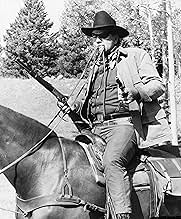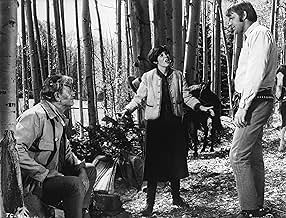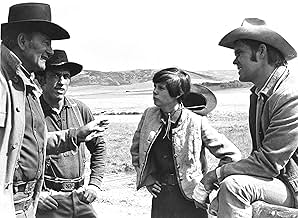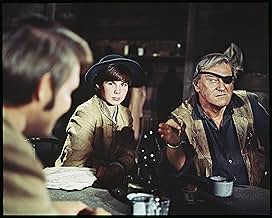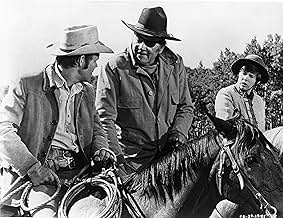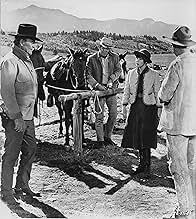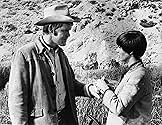झगडालू रूस्टर को एक जिद्दी लड़की (किम डार्बी) उस व्यक्ति को खोजने का काम सौंपती है जो उसके पिता की हत्या करके घर में रखी सारी रकम लेकर चम्पत हो गया.झगडालू रूस्टर को एक जिद्दी लड़की (किम डार्बी) उस व्यक्ति को खोजने का काम सौंपती है जो उसके पिता की हत्या करके घर में रखी सारी रकम लेकर चम्पत हो गया.झगडालू रूस्टर को एक जिद्दी लड़की (किम डार्बी) उस व्यक्ति को खोजने का काम सौंपती है जो उसके पिता की हत्या करके घर में रखी सारी रकम लेकर चम्पत हो गया.
- 1 ऑस्कर जीते
- 6 जीत और कुल 7 नामांकन
फ़ीचर्ड समीक्षाएं
A tough man on a tough hunt for a gang of toughs - it's John Wayne's film all the way, with this he passed into his last phase in the saddle with a continuous wink at the cowboy parody he had become and which no-one else will ever match. By now after 40 years he was an American legend, your giant avuncular instant-lawman starring in his next horse opera - True Grit would really be nothing special without him, with the fat old man it's a nice Western comedy. We in the audience knew he had Grit before he came on, Kim Darby was just too slow on the uptake. I never understood why the script was so uncharitable to the Texican horse-killing son of a bitch Campbell, he's belittled right up to the scenes in Mattie's family graveyard.
Overall a shot in the arm (or leg!) if seen every few years - even in 1969 entertaining action films could still be made!
However, the film does look great. Handsomely shot with great scenery, True Grit is pleasing to the eye. Elmer Bernstein's score is rousing and very fitting, while the story is interesting, most of the characters are credible and the script flows well. Also True Grit is very well directed, and there is a glorious final shoot-out. Other than Campbell and Darby, the other acting is fine. While I would have not personally given the Oscar to this particular performance(I thought he was better in The Searchers, Red River and The Quiet Man) John Wayne is excellent here, and while he doesn't appear until quite later on Robert Duvall also makes a positive impression.
All in all, a very good film but could have been better in my view. 7/10 Bethany Cox
What True Grit does is succeed on both levels, being both great entertainment and giving John Wayne the acting role of a lifetime in the person of Rooster Cogburn.
Mattie Ross from Darnell and Yell County Arkansas personified by Kim Darby has come to Fort Smith seeking the killer of her father Jeff Corey. Turns out he's also killed a State Senator in Texas so Texas Ranger Glen Campbell informs her. Both of them team up with United States Marshal Rooster Cogburn who resides in Fort Smith with Chin Lee and my favorite movie cat, General Sterling Price.
Corey is now in the outlaw band headed by Robert Duvall at large in the Indian Nation Territory that became Oklahoma. True Grit's plot is the trio's pursuit of Duvall, Corey and the rest of the gang.
But oddly enough True Grit isn't really about plot. It's about the creation of a character. Like Margaret Mitchell who wrote Gone With the Wind with Clark Gable in mind for Rhett Butler, Charles Portis wrote the novel True Grit with only John Wayne in mind as Rooster Cogburn. It must have been one singular delight for Charles Portis to see the Duke flesh out Rooster Cogburn exactly as he conceived him.
Tough old Rooster, likes an occasional drink, isn't above a little larceny, but has one stern moral code about real bad guys. Bring him in dead or alive and make sure you shoot first coming up against them. And he's got quite the colorful past as he relates tales of his younger days to Campbell and Darby on the trail.
In other reviews I've said that John Wayne had one of the great faces for movie closeups. You can see a perfect example of that in that scene with John Fiedler who plays Darby's lawyer J. Noble Daggett. A man who rates high in the legal profession in that area having forced a railroad into bankruptcy.
The camera is facing Fiedler as he's talking to Wayne about his visit with Darby who's life Wayne saved. Wayne's got about a third of his face to the camera. But even with that third, your eyes are focused on the Duke and his reactions and then as the camera slowly pans around to Wayne in full face his reaction shots are hysterical. You don't work with scene stealing character actors like Chill Wills, Walter Brennan, and Gabby Hayes for 30 years without learning something.
John Wayne was up against some stiff competition in 1969 for the Best Actor Oscar. It was his second nomination, the first being for Sands of Iwo Jima. He was facing Richard Burton as Henry VIII in Anne of a Thousand Days and a couple of newcomers named Dustin Hoffman and Jon Voight for Midnight Cowboy. He was certainly the sentimental favorite.
If in no other place in our lives, sentiment does have its place in cinema. It was an honor well deserved, not just for one performance but for a lifetime of achievement in cinema being the player who put more people into movie seats than any other person ever. So many of the Duke's contemporaries like Edward G. Robinson, Errol Flynn, Tyrone Power were never even nominated for an Oscar much less win one.
Because the Motion Picture Academy has deemed this John Wayne's grandest cinematic achievement, it's almost a command to support this fine western and the man who defined the western hero and is still defining it.
A few directors in the past have tried to present the West in a more refined way, giving importance to the settings and the characterization. Among them is Henry Hathaway's True Grit, an emotionally charged Western about a fearless; one-eyed Marshall named Rooster Cogburn.
The film very stylishly brings to fore the Western countryside, from the scenario at a public hanging to the courtroom drama. In the latter we see some tense and heated exchange of words between the prosecuting lawyer and the Marshall.
The intriguing plot unfolds itself very nicely on the silver screen. The story is simple. Tom Cheney, a cowboy, kills his employer. Maddie (Kim Darby), the headstrong daughter of the employer, vows to take revenge and get Cheney hanged for the murder of her father. For the mission she enlists the support of one Rooster Cogburn (John Wayne). Now this Rooster is the meanest Marshall in the entire territory. Having lost one of his eyes in the war, he is totally fearless in disposition, talks brazenly and has an unconventional sense of humor. Despite his hardened exterior, he is warm and benevolent at heart. This is evident in the conversations between him and Maddie.
The third angle to the mission comes in the form of Sgt Lebeof (Glen Campbell), an enthusiastic Texas Ranger, who is after Cheney for his own motive of collecting ransom money. At first instance, Maddie has reservations about Lebeof. He comes across as an ill mannered, uncivilized guy to her. Convinced that Maddie will not make him a party to the pursuit of Cheney, Lebeof, secretively, unknowing from her, teams up with Rooster. He takes Rooster into confidence and through him manages an entry into the chase for Cheney.
The character of Lebeof is an interesting study. He comes across as an inexperienced person who has a knack for saying something silly all the times. He is rebuked many times for such uttering by both Maddie and Rooster.
Rooster had his own reasons for going after Cheney. It so happened that this Cheney was an accomplice of Lucky' Ned Pepper (Robert Duvall) and Rooster had some unfinished business with Ned. He recently had shot Ned in the lower lip during a confrontation but Ned had escaped. Now this chase provided Rooster with another shot at Ned.
The chase is beautifully picturized. Especially the final confrontation between Ned's gang and Rooster. The action sequence in this scene must be seen to be believed.
The reverberating and sweet music score by Elmer Bernstein forms an integral part of the plot. Glen Campbell has rendered the opening title song in his trademark voice. True Grit is a treat to watch for its believable depiction of the life and times of the West. Henry Hathaway, a specialist director of the crime, western and thriller genre has masterfully directed this flick. Re-uniting with Wayne after Sons of Katie Elder (1965), he has managed to extract the very best from his leading man. John Wayne has essayed the role of his lifetime. It is impossible to imagine anybody but him in the lead role as a tough, uncouth and drunken Marshall. Interestingly, Wayne won his only Oscar for this role in 1970.
John Wayne's parting comment in this film is directed as much at us the viewers as it is at the young woman his Rooster Cogburn character is addressing. In a way, Wayne throughout the film plays off the image he cemented in dozens of great and near-great westerns, with a nod that by 1969, he along with the western genre had fallen behind the times, that his shoot-first approach to law and order had worn thin with the critical establishment just as it does in Judge Parker's courtroom.
In that way, playing a character of such dogged homicidal cussedness as the hard-drinking, one-eyed ex-Quantrill Raider Rooster Cogburn and giving him a teenaged girl seeking justice to play off so as to showcase his essential decency seems a clever means to win Wayne an Oscar, which he finally did here, a sentimental triumph over some more heralded performances. With such an attitude, you might think "True Grit" would come off a bit of a one-trick pony 37 years on. But it doesn't. In many ways, both the film and Wayne's performance come off better than ever.
Helping matters a lot is the support Wayne receives from two women. As the heroine, Matty Ross, Kim Darby provides Wayne with a fantastic foil, doughty to the point of rudeness, forever finding fault in others but earning your good will through her simple faith in justice and loyalty to the memory of her slain father, for whom she wants Rooster's help avenging. As she is told by a horse dealer she banters with: "I admire your sand."
The other is Marguerite Roberts, whose adaptation of Charles Portis' novel bristles with good humor and an ear for the period. "If ever I meet one of you Texas waddies who ain't drunk water from a hoofprint, I think I'll... I'll shake their hand or buy 'em a Daniel Webster cee-gar," Rooster tells his braggart riding companion, a young Texas Ranger played by country singer and ex-Beach Boy Glen Campbell.
Campbell may be a novice and a third wheel in the interplay between Wayne and Darby, but he acquits himself well and delivers a worthy performance in a cast stacked with talented actors like Robert Duvall, Jeremy Slate, and Strother Martin, not to mention Dennis Hopper, hiding the long hair he made famous in "Easy Rider" that same year. Some of these actors portray bad guys, but Roberts' script and director Henry Hathaway's languid pacing allow them to present some humanizing qualities that go a long way toward making "True Grit" more than your typical shoot-em-up oater.
Even Jeff Corey, who plays a no-account named Chaney who shot Matty's father, has a funny scene when he tells Matty how to cock her pistol, then whines after she shoots him with it: "Everything happens to me!"
About the only fault I can find with the film is Elmer Bernstein's bombastic score, which employs overly ornate orchestration like kettledrums when Matty has her showdown with Chaney and is tuneless apart from the title song, which is Campbell's best moment here. Hathaway's direction is somewhat pedestrian but serves the script, and showcases some incredible autumnal vistas of tall birch and pine where Rooster and Matty search for Chaney, photographed by Lucien Ballard in a style akin to (but more dreamy than) his work on the same year's "The Wild Bunch."
1969 was the last great year for westerns, with this, "The Wild Bunch," "Butch Cassidy And The Sundance Kid," "Support Your Local Sheriff" and "Once Upon A Time In the West," and its interesting how Ballard, Corey, and Strother Martin turned up in more than one of them. But good westerns never really go out of style, they just sit on the shelf awhile like an old Stetson waiting to be rediscovered. Nobody wore a Stetson better, or deserved an Oscar more, than John Wayne. "True Grit" does the double duty of showing why he was a star and further burnishing his luster.
क्या आपको पता है
- ट्रिवियाStunt double Jim Burk performed the entire scene where Rooster Cogburn charged Ned Pepper's gang on horseback. John Wayne was only seen briefly in close-up, and he was riding on a trailer, not a horse.
- गूफ़Rooster reports Lucky Ned Pepper had robbed the KATY Flyer, a train that did not start running until 1896, long after the time in which the story is set.
- भाव
[Rooster confronts the four outlaws across the field]
Ned Pepper: What's your intention? Do you think one on four is a dogfall?
Rooster Cogburn: I mean to kill you in one minute, Ned. Or see you hanged in Fort Smith at Judge Parker's convenience. Which'll it be?
Ned Pepper: I call that bold talk for a one-eyed fat man.
Rooster Cogburn: Fill your hand, you son of a bitch!
- इसके अलावा अन्य वर्जनWhen submitted for a rating from the MPAA in 1969, the film was given an "M". The film was edited and rerated "G". The American VHS version contains the "G" rated cut while the DVD is the uncut "M" version (which would be printed as "PG" since the symbol was changed in the 1970s).
- कनेक्शनEdited into The Kid Stays in the Picture (2002)
टॉप पसंद
- How long is True Grit?Alexa द्वारा संचालित
विवरण
- रिलीज़ की तारीख़
- कंट्री ऑफ़ ओरिजिन
- आधिकारिक साइट
- भाषा
- इस रूप में भी जाना जाता है
- Temple de acero
- फ़िल्माने की जगहें
- उत्पादन कंपनी
- IMDbPro पर और कंपनी क्रेडिट देखें
बॉक्स ऑफ़िस
- US और कनाडा में सकल
- $2,76,418
- US और कनाडा में पहले सप्ताह में कुल कमाई
- $1,57,788
- 5 मई 2019
- दुनिया भर में सकल
- $2,76,418
इस पेज में योगदान दें



